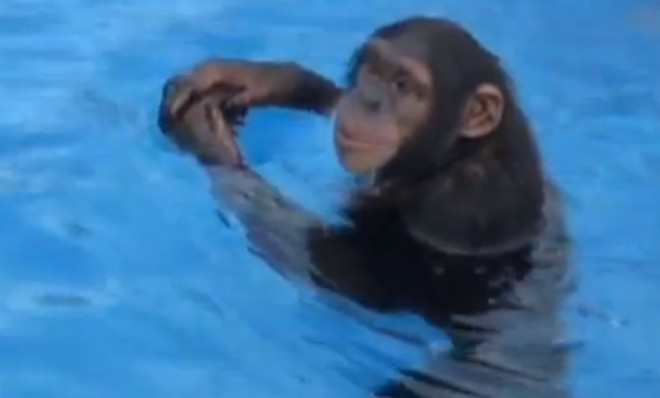WATCH: Apes can swim and dive just like humans
Scientists attribute the similarities to our mutual tree-swinging past


A free daily email with the biggest news stories of the day – and the best features from TheWeek.com
You are now subscribed
Your newsletter sign-up was successful
Learning how to swim is a childhood rite of passage, whether you were part of a dreaded group class, or just thrown into the deep end by your well-meaning parents. But the seemingly absurd notion of dunking your head face down into the water while your arms swing overhead while you pace your breathing might actually be more instinctive than we think.
Footage taken by researcher Renato Bender at the University of Witwatersrand in Johannesburg, South Africa, shows two apes swimming in a pool in a manner that should look familiar to most humans. While almost every other four-legged mammal opts for the doggy-paddle method — which, let's face it, seems far more logical since you can breathe while you move — these two apes taught themselves to essentially swim the breaststroke.
Take a look at the video above. While the orangutan, Suryia, opts for a wild, limb-alternating approach, Cooper the chimpanzee kicks with both his hind legs simultaneously. Both apes swim roughly at the water's surface instead of doggy-paddling slightly above it.
The Week
Escape your echo chamber. Get the facts behind the news, plus analysis from multiple perspectives.

Sign up for The Week's Free Newsletters
From our morning news briefing to a weekly Good News Newsletter, get the best of The Week delivered directly to your inbox.
From our morning news briefing to a weekly Good News Newsletter, get the best of The Week delivered directly to your inbox.
As for how the apes taught themselves to swim like humans, Bender theorizes that our mutual tree-swinging past might be a factor. While apes and humans both have shoulder joints that can move in all directions, most other mammals can only move their shoulders along one plane.
In this case, Bender hypothesizes that the apes' general lack of contact with water may have caused them to lose their natural proclivity to paddle. "You should expect deviation from doggy paddle in animals that, during their evolution, have had little contact with water and therefore almost completely lost the instinct to swim," he says.
But that might not necessarily be the case, argues York University professor Anne Russon. "Monkeys I see often in Borneo are both excellent swimmers and are highly arboreal," Russon says.
A free daily email with the biggest news stories of the day – and the best features from TheWeek.com
Kimberly Alters is the news editor at TheWeek.com. She is a graduate of the Medill School of Journalism at Northwestern University.
